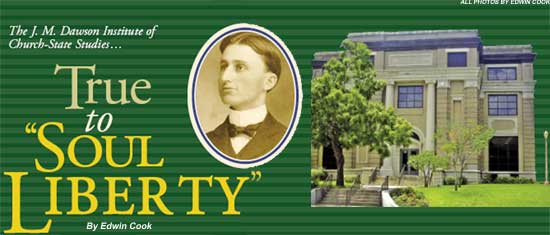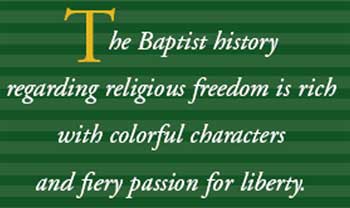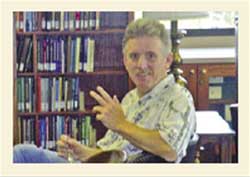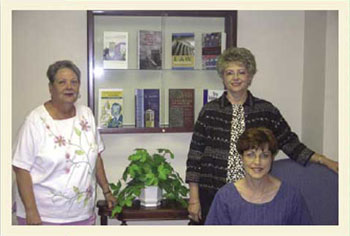True to Soul Liberty
Edwin C. Cook March/April 2008
Getting your Trinity Audio player ready...

While many individuals can be credited with defending our freedoms, and many institutions can be recognized for sustaining them, this year marks the 50th anniversary of one institution that has impacted the realm of religious liberty through such venues as academia, advocacy, literary works, and education. The J. M. Dawson Institute of Church-State Studies at Baylor University has long been recognized for its work in the field of church-state studies.
Recently the Keston Institute, which formerly served a role at Oxford University, England, similar to the role that the Dawson Institute serves at Baylor, opted to donate all of its archival material to the Dawson Institute. While the majority of Keston's work dealt with the satellite countries of the former U.S.S.R., its archival material still makes an invaluable contribution to research in the field of church-state relations in those countries.
History and Founding of the Dawson Institute1
Founded in 1957 at Baylor University, the Dawson Institute was named after a distinguished alumnus, J. M. Dawson. Dawson had been the pastor of the First Baptist Church of Waco for over 30 years, serving from 1915-1946. He reflected the ideals that came to be embodied in the Dawson Institute program. In 1945, as an ardent defender of religious freedom for the individual, he made a global impact for full religious liberty for the individual by presenting to the United Nations Organization over 100,000 signatures from Baptists asking that an article guaranteeing full religious liberty be included in the Universal Declaration of Human Rights (UDHR), which was later formulated in 1948. 2
In 1953 Dawson also authored America's Way in Church, State, and Society, in which he corrected misperceptions about church-state interaction prevalent during the 1950s. At that time, the Roman Catholic Church was arguing for nonpreferential aid, or multiple aid, to all religious groups as the best way to ensure freedom of religion. Dawson clearly drew upon historical information that refuted such notions, showing that Founding Fathers like Madison and Jefferson did not interpret freedom of religion to mean government aid to all religions. 3

The Baptist Vision of Religious Liberty—"Soul Freedom"
With such a beginning, the Dawson Institute has reflected the traditional Baptist position of church-state separation. What has been that position? The Baptist history regarding religious freedom is rich with colorful characters and fiery passion for liberty. Their story of religious liberty in America begins with Roger Williams, who had to flee persecution in the penetrating cold of winter. He founded Rhode Island as a refuge for those being persecuted. 5
Other notable Baptists include legendary individuals like Isaac Backus (eighteenth century) and John Leland, 30 years younger than Backus. Both were Baptist ministers who preached extensively in various locations and faced persecution. One may say that Baptists' intense struggle for religious liberty is what has caused them to hold this cause dear to their hearts—so dear as to lead them to proclaim:
"Baptists have been recorded in history as champions of religious liberty, with a courageous and consistent proclamation of the truth that a man must be absolutely free in his soul's relationship to God—so free that if he chooses, he may not deal with God. Baptists have insisted that there be nothing to hinder a man's free access to God or his willful rejection of God." 6
The theological term Baptists use to describe such a broad platform for religious liberty is soul freedom, which is reflected in the Manifesto on Religious Freedom formulated in 1947. The concept of soul freedom has two associated corollaries: religious liberty and separation of church and state.
Soul freedom7 is the theological concept at the very epicenter of Baptist views on freedom of religion. It is formulated from the concept of Genesis 1:27 that man is made in the image of God. It is inherent, then, to every human being by virtue of God's creative act. Since God alone creates man's soul, then the individual is accountable to God alone. Because man is held responsible for the life he lives, it implies that he is able to respond to God—either by accepting Him or rejecting Him. Either implies a moral choice. Thus, Scripture gives the invitation: "Whosoever will, let him take the water of life freely" (Rev. 22:17; italics added).
Religious liberty 8 follows as a natural corollary of soul freedom and is considered the social component in the schema of religious liberty. Since man was made to respond to God through moral choice, then he must be free from coercion, which only makes hypocrites. Religious liberty is a necessary component to missionary work. Individuals must be allowed the freedom to hear the gospel, weigh the evidence for themselves, and exercise the moral power of choice. For every Baptist who enjoys religious freedom comes the corresponding obligation to seek that same religious freedom for others, thus fulfilling the golden rule.

|
| Professon Barry Hankins of the J.M. Dawson Institute |
Separation of church and state9 follows in sequence after religious liberty. It is the political component in the Baptist schema built upon the concept of soul freedom. The Founding Fathers, such as Jefferson and Madison, were influenced by Baptists in the development of the Bill of Rights. 10 Madison especially adopted the cause of persecuted Baptists in Virginia to argue on political grounds for separation of church and state. 11
Thus, the J. M. Dawson Institute, during the 50 years of its existence, has sought to hold high the Baptist banner of religious liberty, otherwise known as soul freedom. Through the efforts of each successive director of the Dawson Institute, Baptists have sought to offer the unique Baptist position of church-state separation to their students and to society. The Dawson Institute directors, who all have served in the long historical line of those holding high the torch of freedom, include Dr. Paul Geren (1957-1959), Dr. James E. Wood, Jr. (1959-1973 and 1980-1994), 12 Dr. James L. Garret (1973-1980), 13 Dr. Derek Davis (1994-2006),14 and the current interim director, Dr. Christopher Marsh.
Breadth and Influence of the Dawson Institute
Through lectures, conferences, and symposia, the Dawson Institute has provided opportunities for scholars to interact with one another on current issues spanning a wide range of disciplines. Such figures as Justice Antonin Scalia, George Huntston Williams, Dr. Brian Tierney, Dr. Corwin Schmidt, and Senate chaplain Barry Black have given lectures to the institute at Baylor. Not only are students given the opportunity to attend presentations by leading scholars, but they are also encouraged to present their own scholarship at various conferences during the academic year.
At the governmental level, the Dawson Institute has left an indelible mark, as well. The expertise of the institute's faculty is made available to national and international political leaders who have consulted with them on public policy issues. Additionally, faculty members engage in weekend public seminars to better inform citizens about religious liberty issues. Graduates from the Dawson Institute have also been consultants regarding the formulation of legal documents and national constitutions in the areas of freedom of religion and government interaction with religion.

|
| Staffers in front of various books about the institute and produced by professors there. |
Not only by means of the public forum, but also through the literary medium, has the Dawson Institute impacted the church-state arena. The institute publishes its quarterly organ, Journal of Church and State , which includes scholarly articles addressing church-state issues from around the world, book reviews, abstracts of recent dissertations, and announcements of upcoming church-state events. The Journal is distributed to subscribers throughout all 50 states and more than 70 countries. 15
Educational Opportunities
Education is another significant area that the Dawson Institute has impacted through the advanced degree program it offers. Students can pursue either an M.A. or Ph.D. in Church-State Studies, as well as an alternate Ph.D. in Religion, Politics, and Society. Upon completion of graduate coursework, Dawson Institute scholars have entered into religious liberty advocacy work, accepted posts with governmental agencies addressing human rights issues, been employed by religious bodies as liaisons with governmental institutions, and been tenured as university professors.
Designed to encompass the breadth of religious liberty issues, some of the courses offered through the institute include "The History of Church-State in the West," "Church-State in the Reformation Era," "Church and State in the United States," "American Civil Religion," "Religion and Politics in America," "Liberation Theology," "Eastern Perspectives on Church and State," and "Church and State in the Modern World." All courses are designed to offer students a cutting-edge perspective on the development of current church-state issues. For example, "Islam and Democracy" provides students with a balanced and comprehensive understanding of political and religious factors that intersect in the modern world, especially in the aftermath of 9/11.
A further contribution toward recent developments in church-state issues offered by the institute is in the area of sociology of religion. In classes taught by Dr. Christopher Marsh, the institute's current interim director, students are introduced to the seminal thoughts of such renowned sociologists as Peter Berger, Max Weber, and Emile Durkheim regarding the sociological factors that influence religious experience. The sociological dimension attempts to offer an unbiased, objective approach to explaining the phenomena of religious experience, which can be useful in establishing a governmental approach of "benevolent neutrality" toward religion. It also provides the framework for studying the interaction of government and religion from a statistical perspective that seeks to provide a non-prejudicial viewpoint while substantiating conclusions with empirical evidence.
In recognition of the Dawson Institute's 50th anniversary, Baylor president Dr. John M. Lilley commented:
"It is an honor to recognize the 50th anniversary of one of Baylor's most well-established and respected research centers, the J.M. Dawson Institute of Church-State Studies. J.M. Dawson was passionate in his commitment to religious liberty for all people and his insistence that all governments should endeavor to protect this fundamental freedom, which serves as the foundation of human rights. Dawson's influence on church-state relations in America and around the world continues today, with Baylor faculty and graduate students focusing on the historical, religious, political, philosophical, and sociological dimensions in this critical area of study."
1 I am indebted for much of the information in this section to James M. Dunn, "J. M. Dawson: Shaper of Public Affairs and Religious Liberty," a pamphlet in a series entitled "Shapers of Southern Baptist Heritage," published by the Historical Commission of the Southern Baptist Convention (Nashville, Tenn., 1987).
2 In the UDHR, the right to religious freedom is found in Article 18. The Baptist World Alliance "Manifesto on Religious Freedom," adopted one year before the UDHR on August 3, 1947, reflects the Baptist position of full religious liberty for the individual (Tad Stahnke and J. Paul Martin, eds., Religion and Human Rights: Basic Documents [New York, N.Y.: Center for the Study of Human Rights, Columbia University, 1998], pp. 205, 206).
3 J. M. Dawson, America's Way in Church, State, and Society (New York: MacMillan Company, 1953), p. 9.
4 Wallace Daniel, "Editorial: The Journal and the Tradition of Religious Liberty," Journal of Church and State, 48:2 (Spring, 2006): pp. 266, 267.
5 Brent Walker, "Religious Liberty: A Continuing Struggle," in Proclaiming the Baptist Vision: Religious Liberty, Walter B. Shurden, ed. (Macon, Ga.: Smyth and Helwys Publishing, Inc., 1997), p. 103.
6 Report of Special Committee on Church-State Relations to the Executive Board of the Baptist General Convention of Texas (June 6, 1961), 2. Obtained from W. R. Poage Legislative Library, Baylor University, Jack Hightower Files, Group 2 (Personal), Baptist and Baptist General Convention of Texas, folder entitled "Church-State Relations."
7 James M. Dunn, "The Baptist Vision of Religious Liberty," in Proclaiming the Baptist Vision: Religious Liberty, Walter B. Shurden, ed. (Macon, Ga.: Smyth and Helwys Publishing, Inc., 1997), pp. 31-33.
8 Ibid., pp. 33-35.
9 Ibid., pp. 35-37.
10 E. Glenn Hinson, Religious Liberty: The Christian Roots of Our Fundamental Freedoms (Louisville, Ky.: Glad River Publications, 1991), p. 138; Shurden, p. 35.
11 Ellis Sandoz, "Religious Liberty and Religion in the American Founding Revisited" in Religious Liberty in Western Thought, Noel B. Reynolds and W. Cole Durham, Jr., eds. (Atlanta, Ga.: Scholars Press, 1996), pp. 266-269.
12 Daniel, pp. 268, 269.
13 Ibid., p. 271
14 Ibid., pp. 272, 273.
15 Pamphlet #03049GRD 10.04 published by the Graduate School for the Church-State Studies Program, Baylor University, p. 5.
Article Author: Edwin C. Cook
Edwin Cook has a doctorate in church-state studies from Baylor University, Waco, Texas. He writes from Waco.